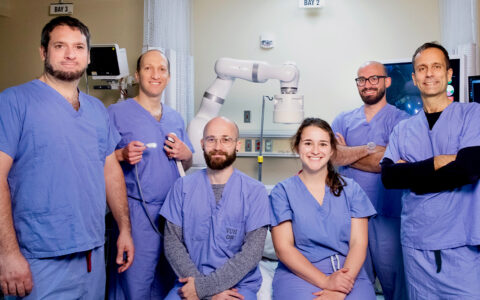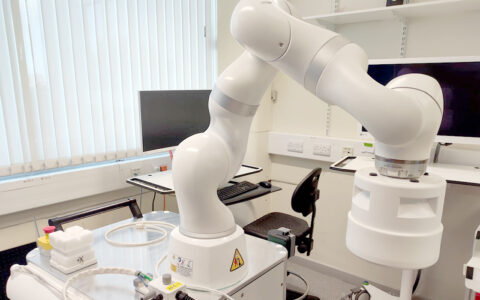The majority of cancer patients experience frequent bowel movements (and often diarrhea) as a side effect of chemotherapy, yet the condition is often relegated to secondary aims in clinical trials. Few cancer trials have tackled this life-limiting side effect head-on.
Now, a new medical drink aims to reduce bowel movement frequency and provide a diarrhea remedy. The proprietary amino acid blend, called Enterade®, is amassing clinical data to support its use in certain cancer populations. A phase 2 trial at Vanderbilt-Ingram Cancer Center is underway to study its benefits in neuroendocrine tumor patients.
“Both carcinoid and non-carcinoid neuroendocrine tumors cause a range of symptoms. The frequency of bowel movements is one of the most debilitating. Many of our patients have to use the restroom six or eight times a day,” said Satya “Nanu” Das, M.D., principal investigator on the new trial and a gastroenterologist at Vanderbilt.
A Proprietary Blend
The Enterade® drink is a glucose-free blend of five essential amino acids: L-Aspartic Acid, L-Valine, L-Serine, L-Threonine and L-Tyrosine. It also contains multiple electrolytes to support rehydration. In a pilot trial, it outperformed commercially available sports drinks.
The concoction is specifically designed to maintain a healthy intestinal lining. “Pre-clinically, it’s been shown to promote absorption in the small intestine by regenerating villi,” Das said. “It also appears to improve barrier function, which can lower infection and colitis risk.”
Focus on Patients
Enterade® has been tested in adults with multiple myeloma and non-Hodgkin lymphoma and in children with short bowel syndrome, among other populations. The Vanderbilt trial will be one of the first to focus on those suffering from neuroendocrine tumors – a rapidly growing population.
Initial results in neuroendocrine tumor patients appear promising. Said Das, “Our trial builds on a retrospective study conducted at the University of Kentucky, in which close to 80 percent of patients reported improvements.”
Das plans to recruit 30 neuroendocrine tumor patients for the Vanderbilt trial, split between those with carcinoid syndrome or non-carcinoid syndrome. Each participant will serve as their own control. Participants will record their bowel movements during a four-week baseline period, and during a four-week intervention period in which they will drink an eight-ounce bottle of Enterade® twice daily. The trial will also monitor serum electrolyte levels and markers of inflammation.
Long-term Goals
The trial is unique in its goals, Das says. “To have a primary endpoint with a supportive care focus is relatively rare. Most neuroendocrine tumor trials focus on cell killing.”
If successful, the trial could help validate Enterade® as a way to improve the quality of life for myriad cancer patients facing frequent bowel movements and serve as a diarrhea remedy. The FDA also categorizes Enterade® as a medical food, which could expedite its approval and widespread use.
Said Das, “If we can show efficacy in this population, the potential ripple effects are extensive. There is a huge gastrointestinal cancer patient population that could benefit. Our goal is to influence side effect management for other tumors as well.”





